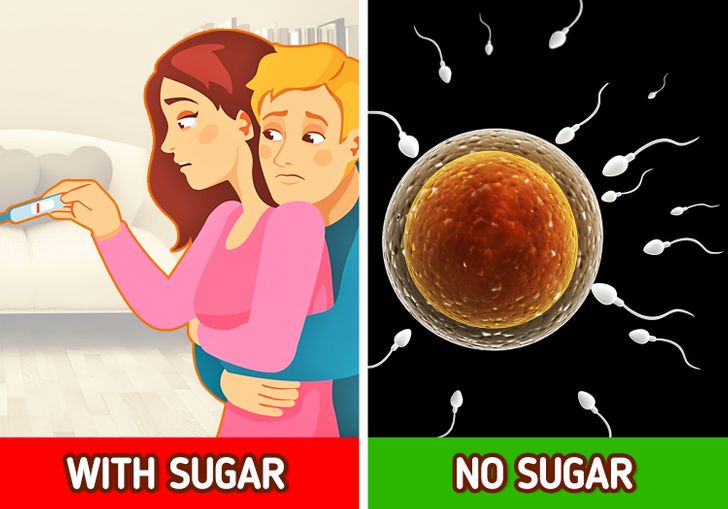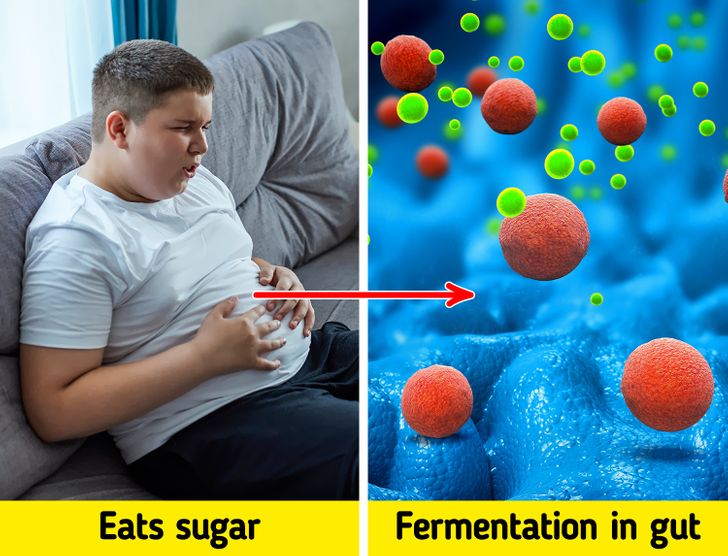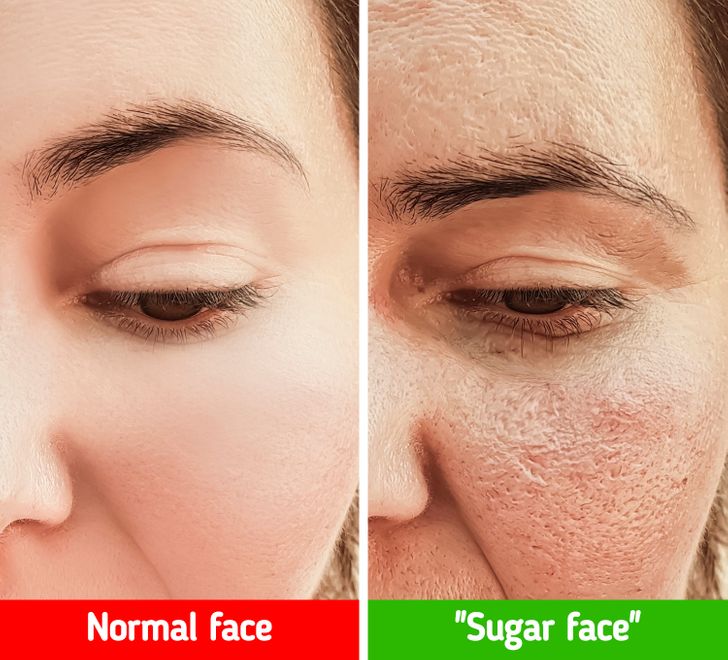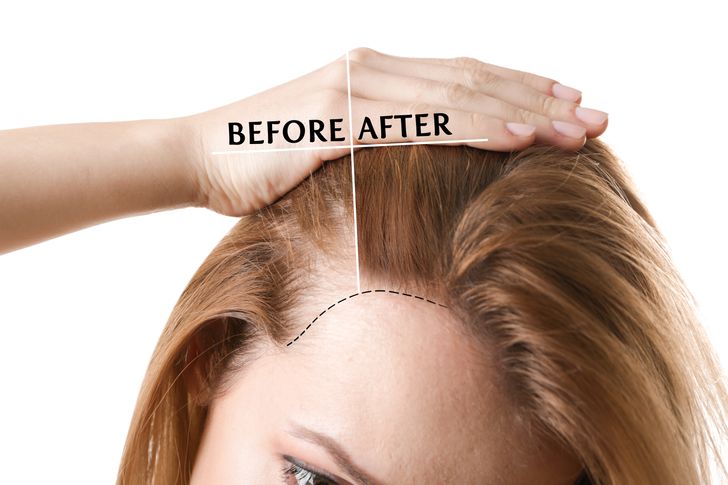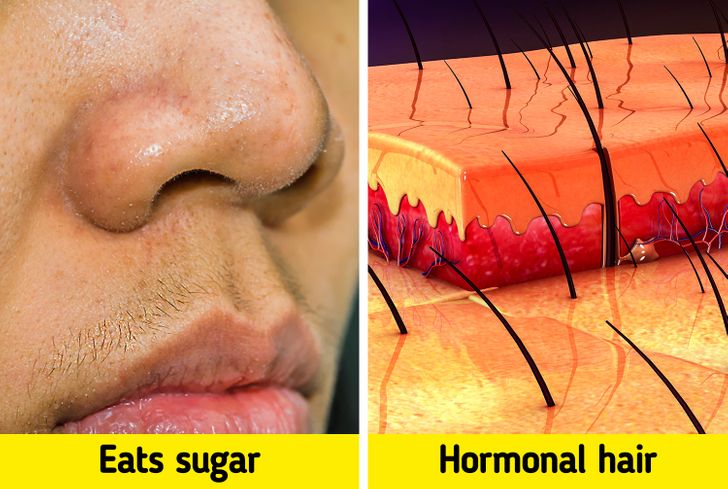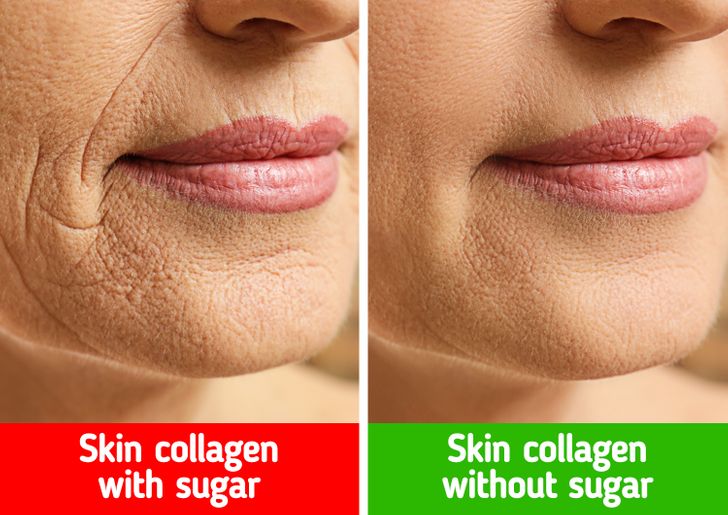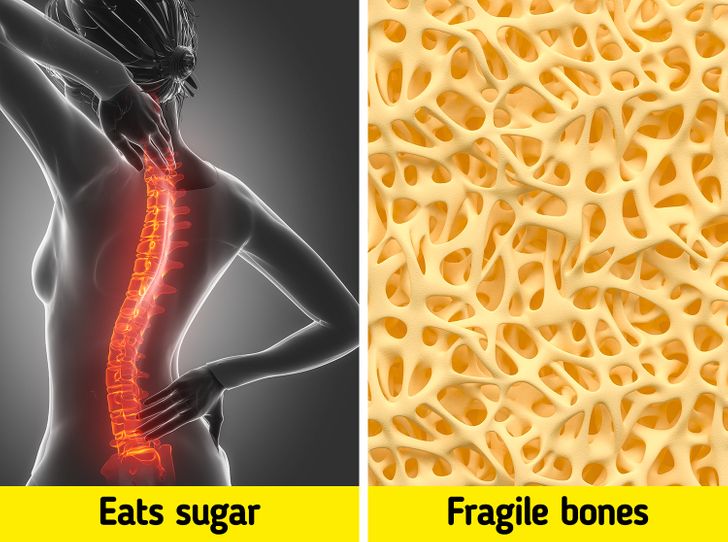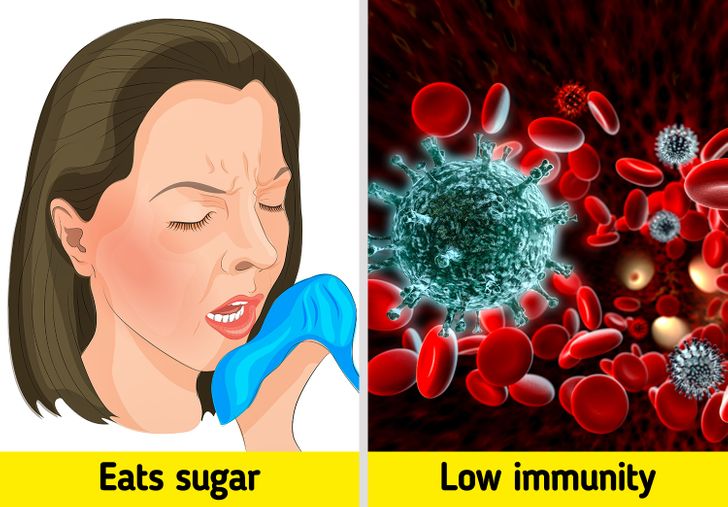“Sugar face,” a mustache above your upper lip, and even infertility — these are just a few effects that are linked to consumption of the insidious white crystal — sugar. Taking it off of our plates and out of our cups may not turn us into superheroes, but it can definitely improve our life and our health.
We do love an occasional cake or coke, so we decided to find out what would happen to our bodies if we put the sugar away, at least for a little while. And the facts that we found out made us want to go count the number of sweets we’ve eaten today. Let’s take a look at them together.
1. You may get pregnant easier.
Sugar is known for its ability to give us energy by triggering insulin in our blood. But insulin is very similar to the hormones that are responsible for pregnancy. If we consume too much refined sugar, there’s so much insulin in our body that it gets confused with the hormones that help egg cells mature, so our body starts working to reduce the level of these hormones. As a result, there are less maturing eggs in our body and it becomes harder for a woman to get pregnant.
2. You won’t be as hungry and your cravings will disappear.
When entering our body, sugar influences our mental abilities as well as our self-control. Studies show that sugar has an addictive effect on some parts of our brain. When we eat sugar, our hunger-provoking hormone increases and our hunger-suppressing hormones lower. We then start craving high-calorie food like cookies or pizza, and we also tend to overeat.
3. Your brain volume may get bigger and your memory may improve.
When our stomach tells us to eat something sweet, our brain says “no,” and here is why. Studies found that even if we don’t gain weight while eating sugar, our brain still feels the discomfort, as our cognitive functions may become slower. We may have impaired memory and become weaker in our decision-making. In addition, our brain may lose its volume and become smaller in certain areas, studies have found.
4.You may stop experiencing mood swings and become more cheerful.
Eating too much sugar may lead to mood disorders and even depression, scientists claim. Diets high in refined sugars may make anxiety stronger and prevent people from enjoying their life with healthy emotions. This happens because refined sugar drains vitamin B from our body, and this is one of the major agents responsible for our mood. Surprisingly, doctors have been using insulin to treat not only diabetes, but also depression, and this treatment has shown some good results.
5. You may avoid auto-brewery syndrome.
Auto-brewery syndrome is a condition where food is fermented in our gut and this process looks a lot like brewing beer. We can even feel drunk because of this, because during this process ethanol is produced and released into our bloodstream. We all have fermentation in our gut, but sugar makes it worse and turns this natural process into the feast of yeast and bacteria.
6. You may avoid having a “sugar face.”
When we think about sugar, it’s often associated with weight gain. But dermatologists are also concerned about this “white enemy.” They claim that sugar provokes hormonal stress, which leads to a poor complexion and has a special name — “sugar face.” The features of “sugar face” are a gray hue of the skin, thinned out eyebrows, spots all over the face, and thinner skin.
7. You may have thicker hair.
According to dermatologists, sugar can provoke hair thinning and hair loss. This happens because the increased level of glucose provokes uneven levels of hormones like insulin and steroids, and the hormonal balance turns into a roller coaster. The scalp is then not well-nourished and we may start losing hair. The right diet will not be able to restore the damage that has already been done, but can prevent future hair loss, doctors claim.
8. You may avoid excessive hair on your face and body.
When we eat refined, processed sugar, we may face the problem of unwanted hair on our body, scientists claim. Sugar provokes an increased level of insulin in our blood, which in its turn provokes higher testosterone levels. This hormone intensifies hair growth and makes hair more pigmented, and its excessive amount may cause dark hair to grow above our upper lip and on our belly. Higher insulin levels and insulin resistance are also linked to PCOS in women.
9. Your skin may start aging slower.
Sugar may not only trigger acne, but it can speed up the aging of our skin, scientists claim. When arriving into our body, sugar takes part in damaging our skin’s collagen, and this process is sped up even more by ultraviolet light. Our skin becomes less elastic and more fragile, and it has increased wrinkles and sagging. Sugar may also suppress the human growth hormone, which is responsible for our metabolism and body composition, and without this hormone, we may look and feel older.
10. Your bones may stay strong.
There is a widespread opinion that salt makes our bones more fragile, because it eliminates the calcium from our body when we pee. But doctors are even more concerned about another white crystal, which may be even worse for our bones, and this is sugar. Recent research has found that sugar makes it hard for our body to metabolize vitamin D and it actually strips our bones of calcium, magnesium, and other nutrients. It might lead to osteoporosis, and our bone tissue becoming fragile.
11. You might be able to forget about period cramps.
While it may seem like a good idea to drown yourself in sweets and chocolates when you’re on your period, gynecologists claim that sugar may actually make things worse. According to doctors, sugar may make cramps worse because it causes inflammation. In addition, you may have increased bloating, abdominal pain and gas, and these may worsen your condition when you’re on your period.
12. You may have a higher immunity.
When we consume sugar regularly and have a high level of it in our blood, we might be disabling our own immunity, scientists claim. Sugar influences white blood cells, which are responsible for fighting bacteria and viruses. By drinking a one-liter bottle of soda or by eating 100 grams of sugar, we reduce the activity of immune cells by 40%, and this means our immunity will be disabled for 4-5 hours.

